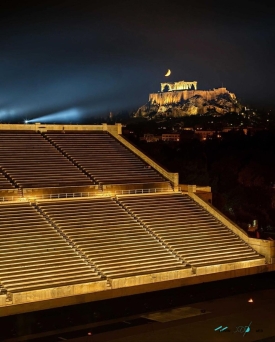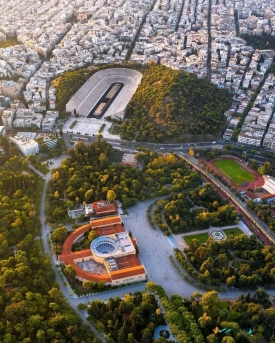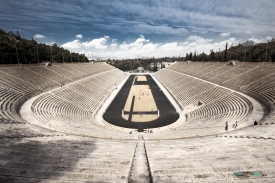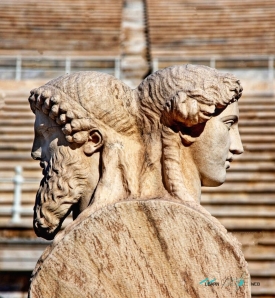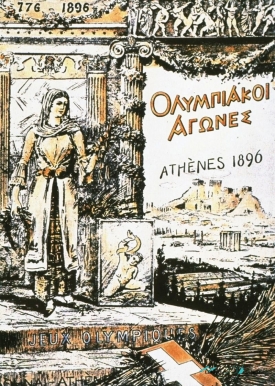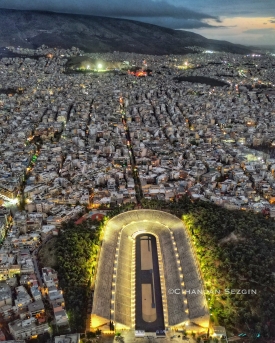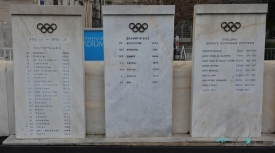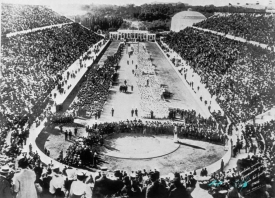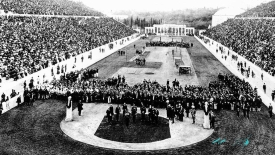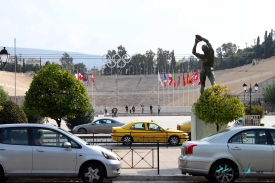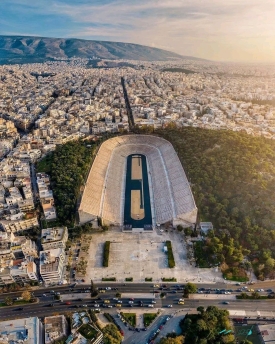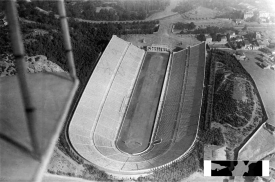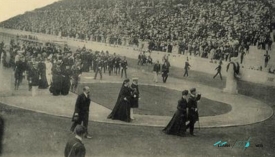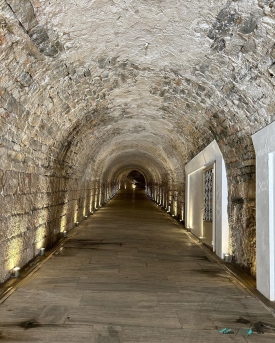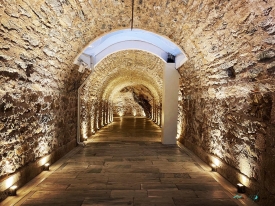The Panathenaic Stadium, also known as Kallimarmaro (beautiful marble), is an ancient stadium located in Athens, Greece. It is the only stadium in the world built entirely of marble and is considered to be one of the most significant architectural and historic landmarks of Greece.
The Panathenaic Stadium is a multi-purpose stadium, and one of the main historic attractions of Athens.The stadium was built on the site of a simple racecourse by the Athenian statesman Lykourgos (Lycurgus) in 330 BC, primarily for the Panathenaic Games. It was rebuilt in marble by Herodes Atticus, an Athenian Roman senator, by 144 AD and had a capacity of 50,000 seats. After the rise of Christianity in the 4th century it was largely abandoned. The stadium was excavated in 1869 and hosted the Zappas Olympics in 1870 and 1875. After being refurbished, it hosted the opening and closing ceremonies of the first modern Olympics in 1896 and was the venue for 4 of the 9 contested sports. It was used for various purposes in the 20th century and was once again used as an Olympic venue in 2004. It is the finishing point for the annual Athens Classic Marathon. It is also the last venue in Greece from where the Olympic flame handover ceremony to the host nation takes place.
In the late 19th century, the stadium was completely reconstructed by the architect Anastasios Metaxas, who designed it to resemble the ancient stadium as much as possible. The reconstruction project used white marble from Mount Penteli, the same material as the original stadium, and the seating capacity was increased to 70,000 spectators.
The Panathenaic Stadium has hosted a number of important events throughout history, including:
The first modern Olympic Games in 1896, where the stadium served as the main venue for the Games. The marathon race finished in the stadium, and the winners were awarded olive wreaths.
The opening and closing ceremonies of the 2004 Athens Olympic Games, which saw the stadium packed with spectators from around the world.
Various concerts and cultural events, including performances by famous musicians such as Luciano Pavarotti, Tina Turner, and Elton John.
Today, the Panathenaic Stadium is open to the public and is a popular tourist attraction in Athens. Visitors can take a tour of the stadium, learn about its history, and even run a lap around the track like the ancient athletes once did.
Yes, the Panathenaic Stadium is considered to be the oldest stadium in the world that is still in use for its original purpose. While the stadium has undergone several reconstructions and renovations throughout history, it has always been used as a venue for athletic competitions, just as it was during the ancient Panathenaic Games. The stadium has also hosted several modern Olympic events and is currently used for ceremonial events and some athletic competitions. Its continuous use for over two millennia makes the Panathenaic Stadium an extraordinary cultural and historical landmark.
History
The Panathenaic Stadium is a multi-purpose stadium, and one of the main historic attractions of Athens.The stadium was built on the site of a simple racecourse by the Athenian statesman Lykourgos (Lycurgus) in 330 BC, primarily for the Panathenaic Games. It was rebuilt in marble by Herodes Atticus, an Athenian Roman senator, by 144 AD and had a capacity of 50,000 seats. After the rise of Christianity in the 4th century it was largely abandoned. The stadium was excavated in 1869 and hosted the Zappas Olympics in 1870 and 1875. After being refurbished, it hosted the opening and closing ceremonies of the first modern Olympics in 1896 and was the venue for 4 of the 9 contested sports. It was used for various purposes in the 20th century and was once again used as an Olympic venue in 2004. It is the finishing point for the annual Athens Classic Marathon. It is also the last venue in Greece from where the Olympic flame handover ceremony to the host nation takes place.
Reconstruction
In the late 19th century, the stadium was completely reconstructed by the architect Anastasios Metaxas, who designed it to resemble the ancient stadium as much as possible. The reconstruction project used white marble from Mount Penteli, the same material as the original stadium, and the seating capacity was increased to 70,000 spectators.
Events
The Panathenaic Stadium has hosted a number of important events throughout history, including:
The first modern Olympic Games in 1896, where the stadium served as the main venue for the Games. The marathon race finished in the stadium, and the winners were awarded olive wreaths.
The opening and closing ceremonies of the 2004 Athens Olympic Games, which saw the stadium packed with spectators from around the world.
Various concerts and cultural events, including performances by famous musicians such as Luciano Pavarotti, Tina Turner, and Elton John.
Today, the Panathenaic Stadium is open to the public and is a popular tourist attraction in Athens. Visitors can take a tour of the stadium, learn about its history, and even run a lap around the track like the ancient athletes once did.
Is the Panathenaic Stadium the world's oldest still in use?
Yes, the Panathenaic Stadium is considered to be the oldest stadium in the world that is still in use for its original purpose. While the stadium has undergone several reconstructions and renovations throughout history, it has always been used as a venue for athletic competitions, just as it was during the ancient Panathenaic Games. The stadium has also hosted several modern Olympic events and is currently used for ceremonial events and some athletic competitions. Its continuous use for over two millennia makes the Panathenaic Stadium an extraordinary cultural and historical landmark.



